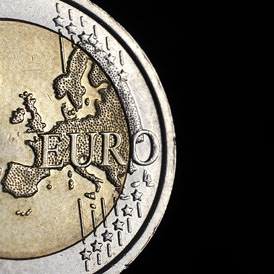Fitch: It’s too late to solve eurozone crisis
France dodges downgrade but credit agency says it’s too late for a comprehensive solution to the sovereign debt crisis as other countries’ ratings slide.

The credit rating agency Fitch has told the eurozone countries it believes a comprehensive solution to the debt crisis is “technically and politically beyond reach”.
Fitch reaffirmed France’s top-notch triple-A rating but said the outlook was now negative, meaning it could be downgraded within two years.
The agency put Belgium, Spain, Slovenia, Italy, Ireland, and Cyprus on negative watch, which could mean a downgrade within three months.
Later another agency, Moody’s, cut Belgium’s credit rating by two notches, saying the eurozone crisis raised funding risks for countries with high public debt burdens, and said a further downgrade was possible within two years.
Standard & Poor’s had already warned 15 of the currency bloc’s 17 members they were close to a downgrade.
Anglo-French spat
The prospect of a downgrade for France had prompted a string of comments from French politicians complaining that the credit rating agencies were taking an overly optimistic view of the British economy.
Finance Minister Francois Baroin said: “The economic situation in Britain today is very worrying, and you’d rather be French than British in economic terms.”
And French Prime Minister Fillon said: “When I look at our British friends, who are even more indebted than us and carrying a bigger deficit, what I see is that the ratings agencies so far don’t seem to have noticed.”
A spokesman for Deputy Prime Minister Nick Clegg said: “Fillon made clear it had not been his intention to call into question the UK’s rating but to highlight that ratings agencies appeared more focused on economic governance than deficit levels.
“The Deputy Prime Minister accepted his explanation but made the point that recent remarks from members of the French government about the UK economy were simply unacceptable and that steps should be taken to calm the rhetoric.”
World Bank President Robert Zoellick said he was “deeply troubled” by the exchanges.
Tension over court threat
There are also signs of tension between Italy and Germany over plans for tough new rules that would see members of the “fiscal compact” of eurozone countries and aspiring members taken to the European Court of Justice if they did not meet agreed budget goals.
German Chancellor Angela Merkel has led a push for automatic sanctions for deficit “sinners” in the bloc, but Italian Prime Minister Mario Monti said Europe’s response “should be wrapped in a long-term sustainable approach, not just to feed short-term hunger for rigour in some countries”.
He added: “To help European construction evolve in a way that unites, not divides, we cannot afford that the crisis in the eurozone brings us … the risk of conflicts between the virtuous North and an allegedly vicious South.”
The former Conservative chancellor Lord Lamont said that without faster progress the single currency risked exploding.
He said: “The markets do not believe this is credible. All we ever get is headline, headline, headline and the detail hardly ever gets filled in. When we do get some of the detail, inevitably some people are separating themselves from it.
“We need to get on with this a bit faster if the euro is going to survive in any sort of form. The choice is between contraction or explosion.
He went on: “There is not time left. Italy and other countries cannot go on with interest on their bonds near to 7 per cent. At some point there is going to be a real crisis.
“One of the big dangers is the longer it goes on, the more likely it is that a big financial institution somewhere is going to get into trouble because of its holding of sovereign bonds.
“This is going to happen if a crisis solution is not found very soon.”